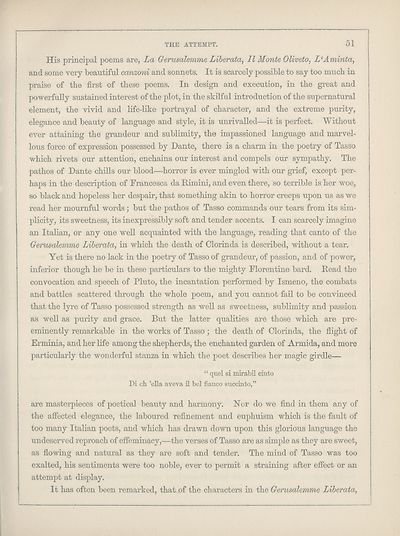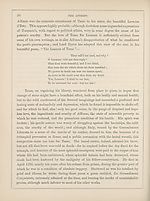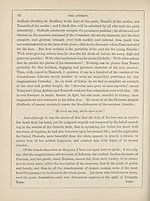Download files
Complete book:
Individual page:
Thumbnail gallery: Grid view | List view

THE ATTEMPT. 51
His principal poems are, La Gerusalemme Liberata, II Monte Oliveto, L'Aminta,
and some very beautiful canzoni and sonnets. It is scarcely possible to say too much in
praise of the first of these poems. In design and execution, in the great and
powerfully sustained interest of the plot, in the skilful introduction of the supernatural
element, the vivid and life-like portrayal of character, and the extreme purity,
elegance and beauty of language and style, it is unrivalled—it is perfect. Without
ever attaining the grandeur and sublimity, the impassioned language and marvel¬
lous force of expression possessed by Dante, there is a charm in the poetry of Tasso
which rivets our attention, enchains our interest and compels our sympathy. The
pathos of Dante chills our blood—horror is ever mingled with our gi'ief, except per¬
haps in the description of Francesca da Rimini, and even there, so teiTible is her woe,
so black and hopeless her despair", that something akin to horror creeps upon us as we
read her mournful words; but the pathos of Tasso commands our tears from its sim¬
plicity, its sweetness, its inexpressibly soft and tender accents. I can scarcely imagine
an Italian, or any one well acquainted with the language, reading that canto of the
Gerusalemme Liberata, in which the death of Clorinda is described, without a tear.
Yet is there no lack in the poetry of Tasso of grandeur, of passion, and of power,
inferior though he be in these particulars to the mighty Florentine bard. Read the
convocation and speech of Pluto, the incantation performed by Ismeno, the combats
and battles scattered through the whole poem, and you cannot fail to be convinced
that the lyre of Tasso possessed strength as well as sweetness, sublimity and passion
as well as purity and grace. But the latter qualities are those which are pre¬
eminently remarkable in the works of Tasso ; the death of Clorinda, the flight of
Erminia, and her life among the shepherds, the enchanted garden of Armida, and more
particularly the wonderful stanza in which the poet describes her magic girdle—
" quel si mirabil cinto
Di ch 'ella aveva 11 bel fiauco sucointo,"
are masterpieces of poetical beauty and harmony. Nor do we find in them any of
the affected elegance, the laboured refinement and euphuism which is the fault of
too many Italian poets, and which has drawn down upon this glorious language the
undeserved reproach of effeminacy,—the verses of Tasso are as simple as they are sweet,
as flowing and natural as they are soft and tender. The mind of Tasso was too
exalted, his sentiments were too noble, ever to permit a straining after effect or an
attempt at display.
It has often been remarked, that of the charactera in the Gerusalemme Liberata,
His principal poems are, La Gerusalemme Liberata, II Monte Oliveto, L'Aminta,
and some very beautiful canzoni and sonnets. It is scarcely possible to say too much in
praise of the first of these poems. In design and execution, in the great and
powerfully sustained interest of the plot, in the skilful introduction of the supernatural
element, the vivid and life-like portrayal of character, and the extreme purity,
elegance and beauty of language and style, it is unrivalled—it is perfect. Without
ever attaining the grandeur and sublimity, the impassioned language and marvel¬
lous force of expression possessed by Dante, there is a charm in the poetry of Tasso
which rivets our attention, enchains our interest and compels our sympathy. The
pathos of Dante chills our blood—horror is ever mingled with our gi'ief, except per¬
haps in the description of Francesca da Rimini, and even there, so teiTible is her woe,
so black and hopeless her despair", that something akin to horror creeps upon us as we
read her mournful words; but the pathos of Tasso commands our tears from its sim¬
plicity, its sweetness, its inexpressibly soft and tender accents. I can scarcely imagine
an Italian, or any one well acquainted with the language, reading that canto of the
Gerusalemme Liberata, in which the death of Clorinda is described, without a tear.
Yet is there no lack in the poetry of Tasso of grandeur, of passion, and of power,
inferior though he be in these particulars to the mighty Florentine bard. Read the
convocation and speech of Pluto, the incantation performed by Ismeno, the combats
and battles scattered through the whole poem, and you cannot fail to be convinced
that the lyre of Tasso possessed strength as well as sweetness, sublimity and passion
as well as purity and grace. But the latter qualities are those which are pre¬
eminently remarkable in the works of Tasso ; the death of Clorinda, the flight of
Erminia, and her life among the shepherds, the enchanted garden of Armida, and more
particularly the wonderful stanza in which the poet describes her magic girdle—
" quel si mirabil cinto
Di ch 'ella aveva 11 bel fiauco sucointo,"
are masterpieces of poetical beauty and harmony. Nor do we find in them any of
the affected elegance, the laboured refinement and euphuism which is the fault of
too many Italian poets, and which has drawn down upon this glorious language the
undeserved reproach of effeminacy,—the verses of Tasso are as simple as they are sweet,
as flowing and natural as they are soft and tender. The mind of Tasso was too
exalted, his sentiments were too noble, ever to permit a straining after effect or an
attempt at display.
It has often been remarked, that of the charactera in the Gerusalemme Liberata,
Set display mode to: Large image | Transcription
Images and transcriptions on this page, including medium image downloads, may be used under the Creative Commons Attribution 4.0 International Licence unless otherwise stated. ![]()
| Ladies' Edinburgh Debating Society publications > Attempt > Volume 3 > (65) Page 51 |
|---|
| Permanent URL | https://digital.nls.uk/104344012 |
|---|
| Attribution and copyright: |
|
|---|

